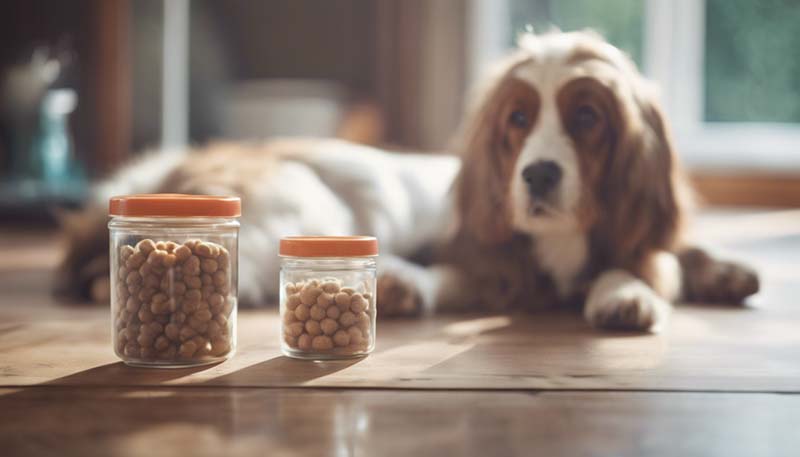Special Dietary Needs for Pregnant and Nursing Pets
2024-04-17 Pet Nutrition Needs 159 COMMENT
Pregnancy and nursing are critical times in a pet\'s life that require careful attention to their dietary needs. Proper nutrition is essential for the health and well-being of both the mother and her offspring. In this article, we will explore the special dietary needs of pregnant and nursing pets and provide guidance on how to meet these needs.
## Introduction
Pregnancy and nursing are demanding times for a pet\'s body. The mother\'s body undergoes significant changes to support the growth and development of her offspring. Proper nutrition is crucial during these times to ensure the health and well-being of both the mother and her babies.
## Nutritional Needs of Pregnant Pets
During pregnancy, a pet\'s nutritional needs increase to support the growth and development of her offspring. The following are some of the key nutritional needs of pregnant pets:
1. **Increased Caloric Intake**: Pregnant pets require more calories than they do when they are not pregnant. The exact increase in caloric intake will depend on the size and breed of the pet, but it is generally recommended to increase the amount of food by 25-50% during pregnancy.
2. **Protein**: Protein is essential for the growth and development of the offspring. Pregnant pets require more protein than they do when they are not pregnant. High-quality animal proteins, such as chicken, beef, or fish, are ideal sources of protein.
Advertisement
3. **Fatty Acids**: Fatty acids, particularly omega-3 and omega-6 fatty acids, are important for the development of the offspring\'s brain and nervous system. Fish oil is a great source of omega-3 fatty acids.
4. **Vitamins and Minerals**: Pregnant pets require additional vitamins and minerals to support the growth and development of their offspring. Vitamins A, D, E, and K, as well as minerals such as calcium and phosphorus, are particularly important.
5. **Adequate Fiber**: Fiber is essential for maintaining healthy digestion and preventing constipation during pregnancy.
## Nutritional Needs of Nursing Pets
Nursing pets also have special dietary needs to support the growth and development of their offspring. The following are some of the key nutritional needs of nursing pets:
1. **Increased Caloric Intake**: Nursing pets require even more calories than they did during pregnancy to produce milk for their offspring. The exact increase in caloric intake will depend on the size and breed of the pet, but it is generally recommended to increase the amount of food by 50-100% during nursing.
2. **High-Quality Protein**: Protein is essential for producing milk and supporting the growth and development of the offspring. Nursing pets require a high-quality, easily digestible source of protein.
3. **Adequate Water Intake**: Nursing pets need to stay well-hydrated to produce enough milk for their offspring. It is important to provide fresh water at all times and encourage the pet to drink regularly.
4. **Vitamins and Minerals**: Nursing pets require additional vitamins and minerals to support the growth and development of their offspring. Vitamins A, D, E, and K, as well as minerals such as calcium and phosphorus, are particularly important.
5. **Adequate Fiber**: Fiber is essential for maintaining healthy digestion and preventing constipation during nursing.
## Tips for Meeting the Dietary Needs of Pregnant and Nursing Pets
Here are some tips for meeting the dietary needs of pregnant and nursing pets:
1. **Choose a High-Quality Pet Food**: Look for a pet food that is specifically formulated for pregnant and nursing pets. These pet foods are designed to meet the increased nutritional needs of pregnant and nursing pets.
2. **Increase the Amount of Food**: Gradually increase the amount of food you are feeding your pet during pregnancy and nursing to meet their increased caloric needs. Be sure to monitor your pet\'s weight and adjust the amount of food accordingly.

3. **Provide Fresh Water**: Always provide fresh water for your pet to ensure they stay well-hydrated.
4. **Avoid Human Foods**: Many human foods are not suitable for pets and can cause digestive upset or other health problems. Stick to a high-quality pet food that is specifically formulated for pregnant and nursing pets.
5. **Consult Your Veterinarian**: Your veterinarian can provide guidance on the specific dietary needs of your pet during pregnancy and nursing. They may also recommend additional supplements or medications to support your pet\'s health.
## Conclusion
Proper nutrition is essential for the health and well-being of pregnant and nursing pets and their offspring. By providing a high-quality pet food that is specifically formulated for pregnant and nursing pets, increasing the amount of food, providing fresh water, and consulting your veterinarian, you can help ensure that your pet receives the nutrients they need during these critical times.
Comments